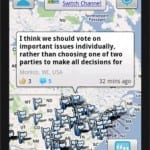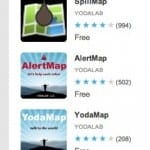 That we have become a polarized nation across America’s political gridiron is perhaps the most disturbing sign of our times, characterized by rigid partisanship and refusal to compromise.
That we have become a polarized nation across America’s political gridiron is perhaps the most disturbing sign of our times, characterized by rigid partisanship and refusal to compromise.
But when the intolerance crosses over into mobile software development and death threats directed against App developers, things have seriously gone off the grid.
VoterMap for Android has been attracting users for over two years, having been singled out as a “Featured App” in Google’s Android App Store several times. The App by Seattle-based YodaLab makes use of the built-in GPS capability of Android phones and allows users to drill down to their local coordinates on a map (VoterMap uses the Google Maps platform), and then express opinions by posting comments in text, photos, or videos at the local community level.
The App includes a “fuzzy location” filter to obscure exact locations where desired for user privacy. Voters can weigh in on the topics of most personal significance wherever they live or work. At last count, VoterMap had been downloaded over 700,000 times, reaching peaks of 8,000 new downloads per day.
No “hanging chads” or “missing ballots” here. Although problems can arise when an occasional post is so extreme as to be offensive. In that case, VoterMap provides for a rather democratic (with a small “d”) solution. If a post is given a “thumbs down” or marked as spam by a number of community members, the offending remark will be automatically removed according to a proprietary algorithm. Such a practice is not dissimilar to a post being “buried” by a social news site like DIGG, or the recent banning of a controversial user on Reddit.
 While VoterMap requires email authentication, the App does not require users to expose their real identity. From behind the mask of anonymity, users are free to express their political views. Only a jury of their voting peers can pull them off of their “local political soapbox.”
While VoterMap requires email authentication, the App does not require users to expose their real identity. From behind the mask of anonymity, users are free to express their political views. Only a jury of their voting peers can pull them off of their “local political soapbox.”
Brian Cohee and Kelvin Xiong founded YodaLab and created a general purpose platform that uses real-time geo-tagged posts and comments for a variety of purposes. Before VoterMap, the two launched SpillMap, a map-based forum for those in the Gulf region afflicted by Hurricane Katrina and the BP Oil Spill.
By crowdsourcing the concerns and comments of various constituencies like local residents, fisherman, environmentalists and others, and specifying their locations on the map, the mobile App can deliver a cross-section of public viewpoints that may otherwise go unnoticed and can alert the public at large to potential health hazards and other real-world problems and conditions.
The developers feel that multiple points-of-view are important, but when free speech crosses the line to hate speech or language that is inflammatory or obscene, the VoterMap community is free to take action. After all, no one wants abusive language hitting that “close to home.”
For a sampling of the discourse on VoterMap, Web surfers can check out http://yodamap.com
VoterMap is free and can be downloaded for Android (an iOS App is being planned) at http://play.google.com/store/apps/details?id=com.yodamap.votermap&feature=search_result#?t=W251bGwsMSwyLDEsImNvbS55b2RhbWFwLnZvdGVybWFwIl0
 The YodaMap app is also available for Android at http://play.google.com/store/apps/details?id=com.yodamap.android [24×7]
The YodaMap app is also available for Android at http://play.google.com/store/apps/details?id=com.yodamap.android [24×7]




















